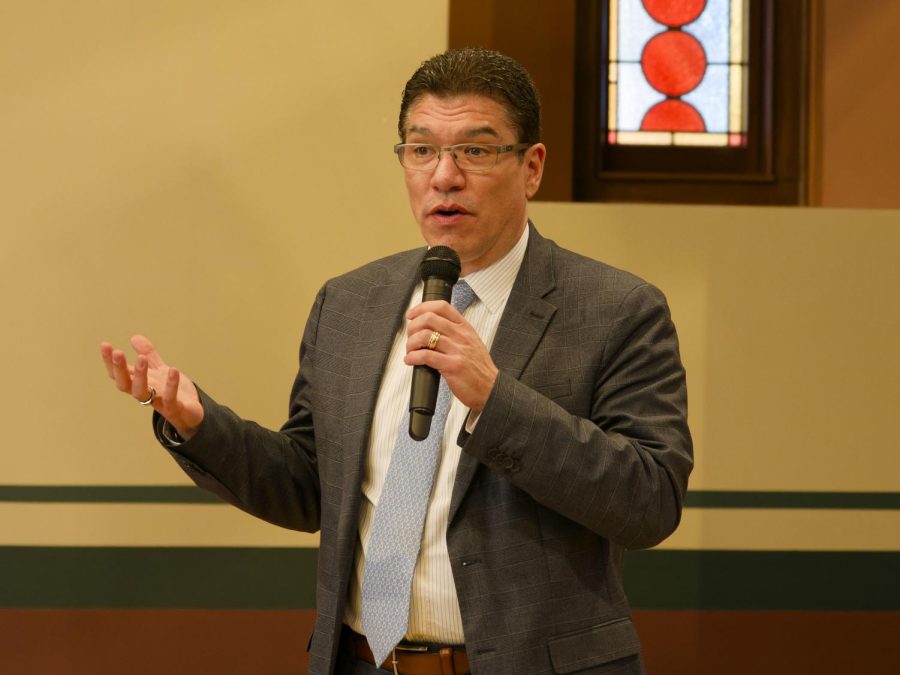In an open forum with University of Massachusetts students and faculty on Wednesday, Feb. 13, chancellor search finalist Javier Reyes spoke about student engagement, mental health and accountability.
Reyes is the interim chancellor at the University of Illinois Chicago, which has more than 33,000 students and 13,000 faculty and staff. He has experience working as the Milan Puskar dean of the John Chambers College of Business and Economics at West Virginia University and the vice provost for online and distance learning at the University of Arkansas.
Reyes’ administrative ideology centers around adjusting campus culture and implementing “holistic” policies. Rather than blindly pushing initiatives from an administrative level, Reyes believes that long-lasting change comes from listening to students, faculty and other administrators.
Reyes received multiple questions about student engagement, including athletics, diversity, equity and inclusion initiatives and student government. Quinn McCarron, a UMass athletics student fan also known as UMass Reindeer, was live-Tweeting the forum. McCarron took a short pause to ask Reyes what he would do to improve UMass athletics and the “struggling” football team.
The prospective chancellor began to answer his question by stating, “[Athletics] provides reasons for people to come back to support and engage with the campus,” and highlighted how important athletics are to a campus community.
He broadened McCarron’s question to include other student performers that do not receive as much attention and support: “Why are you not asking about student performers when it comes to the arts and performing arts? We can engage with the same part of the community,” Reyes said. While acknowledging the importance of sports in the community, Reyes also aims to “shine a light” on other student performers.
In response to a question from an online viewer about DEI initiatives, Reyes emphasized his focus on addressing campus concerns from a campus-cultural perspective.
“I think universities jumped on the idea that we’re going to create diverse campuses instead of looking for programming in general that engages [diverse groups],” Reyes said. He suggested that the campus not only celebrate Black history during Black History Month, but rather celebrate the histories and accomplishments of minority groups every day.
“Why are we only celebrating on specific days?” Reyes asked. “That’s not inclusive. We should be doing programming about all ethnicities every day of the year and celebrate the best successes of the year on holidays.”
Reyes plans to hold listening sessions and encourages students to help educate both him and other administrators about the best way to handle sensitive situations. “Sometimes [students] need to educate us about how to understand their needs,” Reyes said. “If we spend more time listening, I think that’s going to take us to the next level of diversity and inclusion.”
Reyes hopes to engage more often with students by increasing the number of listening sessions and including student voices on more policy decisions. In his previous work at other universities, Reyes claimed that “there’s initiatives I’ve sent back because they had no student input.”
He also spoke about the responsibility students have to include faculty and administrators in student events, referencing a homecoming dance he attended as an administrator after students formally invited him. “Sometimes we feel like we don’t belong in student activities, invite us,” Reyes said.
Reyes’ stance on the state of the campus’ mental health is consistent with his overarching narrative: “It doesn’t matter how many resources you throw at a mental health issue, until people feel comfortable and safe on campus, you will never win that fight,” he said.
“We have to change the culture on the campuses, where people feel comfortable to talk about things,” Reyes said in response to a question about improving mental health services at UMass. He acknowledged the importance of having counselors and therapists on campus, but hopes to tackle students’ mental health at a cultural level.
In response to a question asked about the prevalence of sexual violence in the UMass community in the past few years, Reyes said, “We’re going to take a holistic approach to the well-being of our students from the way they eat, the way they exercise, and the way they conduct themselves when they have anxieties or when they have issues… We have to start figuring out what is the best way to support those students and not just say ‘oh, we’re going to bring more resources to this.’”
Reyes stressed the importance of accountability in his actions and the policies set forward by administrators. Reyes claimed that at the end of meetings with other faculty he would often say, “Tell me something I’m doing wrong. I’m not perfect; I have a lot to learn. Help me understand and help me be better.”
Reyes said that administrators often don’t ask enough questions about their policies and should ask, “What’s the plan? How are you going to assess how things are successful and how are you going to maintain [these policies]?” Reyes plans to hold the UMass administration accountable, but emphasized, “I first hold myself accountable.”
“You have a lot to be proud of, I want to come be a part of this university.” Reyes concluded the forum by thanking faculty and students for their time.
Other chancellor finalist Paul Tikalsky also participated in two listening sessions on Feb. 10, which you can read about here.
Lucas Ruud can be reached at [email protected].




















